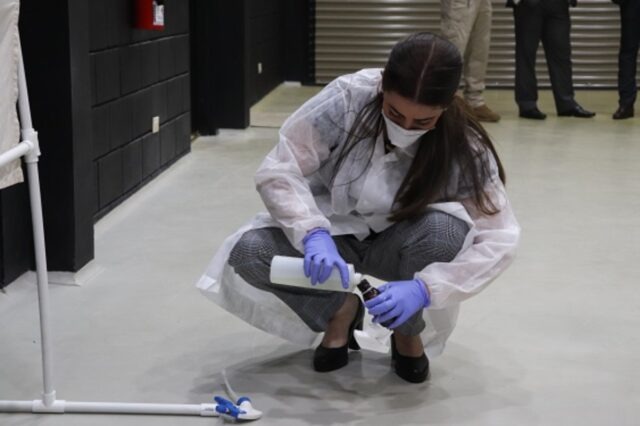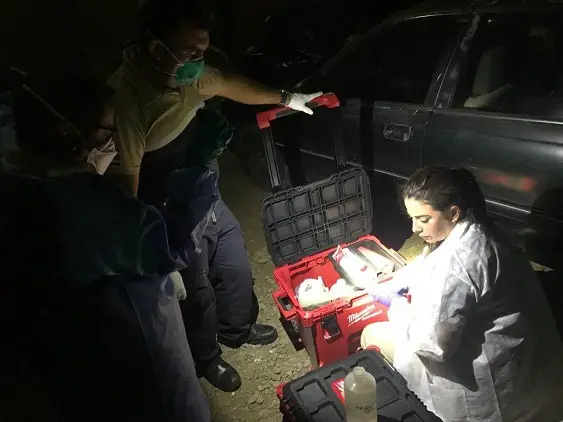In 2010 Tatiana López had to present a University project, she was already working in the Judicial Branch and, together with her partner, Alejandro Castillo, reflected for her work one of the dreams she had for years, the design of a portable laboratory where, under adequate conditions, analyzes of the crime scenes that had been modified could be carried out. A decade later, her task evolved, the dream was fulfilled and the laboratory became a reality and has been part of the many innovations that Costa Rica has had in forensic science.
Expert
At 49, Tatiana López does not hesitate to look at the past and remember each of the obstacles that she went through to improve the techniques of analysis of crime scenes and, better yet, she looks forward to the future because she still has many dreams to fulfill. .
López began studying biology at the National University (UNA) in 1993, a year later (1994) she began to learn about forensic biology, a profession that had only been in the country for three years.
Her interest became greater, and life presented the opportunities that Dona Tatiana occupied, “I don’t like to say that it was a coincidence, I say that it was in the line of my life, with what I was going to run into, have the opportunity”.
She explained that at that time (at the beginning of her studies) she only thought of being able to help in cases of crimes related to sexual crimes, helping children, older adults and women when something happened to them and “who wanted to understand or have a reason for being”. The forensic biology course lasted six months and since then the passion began. López is a biologist, criminologist, criminalist and has received multiple trainings in various areas.
Passion
Tatiana is 49 years old and 25 of them have been dedicated to finding evidence, analyzing crime scenes and improving techniques. She knows that her work represents a lot of responsibility because she must seek the evidence to clarify deaths or crimes.
“A very important thing is to love what we do, that our work is a passion, I can guarantee that I love what I do, for me it is a passion,” said Tatiana, recognizing that sometimes fatigue comes from work, but it is not possible to stop because there are many families that require answers.

“I feel that I have helped people, that with my work from any aspect, no matter how small, has helped people. Perhaps I help a family to understand a little or to understand a little what happened from the perspective that there is one more test that can be useful and that it can become important evidence for that case, that for me is a great satisfaction.
“I always see it that way, I work here because I love it, I’m passionate about my work; But, I also work for the family of that victim who remains and who hopes that justice will be brought, but I also work for someone who has to pay for what they did or for someone who is being judged for something they did not do, that is always my idea every day,” said the expert.
Advances
Her work in the Judiciary began in 1996 when they started calling her to make substitutions and since then, she says, she loves what she does and the institution she works for. “We were, at that time, starting forensic sciences, they were starting up and I had the opportunity to go through various sections, biochemistry, toxicology, biology, I even had to be in areas where, basically, we had to start from scratch and definitely my passion was created.
“Hand in hand with the scientific side, I always wanted to do more, when I felt something was missing, that I needed to find more to that test, a lot of ideas rained in my mind that I wanted to develop and still today, I sometimes tell my brain – stop inventing, don’t go on – because every time I see something different and I know it can be done again, because I always have such a desire to go and change, modify and that we can improve,” said López, stating that although she has received multiple trainings in various areas (ballistics, field analysis, scene management, doubtful writing and document analysis, among others), her strong point is the handling of the crime scene.
Her work has been developed in the Department of Forensic Sciences and the Canine Unit, right now he is working on a project to improve techniques
“At this moment I am in charge of a project called the consolidation of the multidisciplinary team and field criminology, and the idea is to make a team where we work on highly specialized scenarios, but also within my work and what I have in charge is all that are the scenes, the analysis and collection of evidence in modified scenes where it is presumed that a crime event has occurred and this has been tried to erase and that is why they are called modified scenes, where the blood is not seen through with the naked eye, what we call latent blood tests.

“We also do the search for evidence with blood in scenes, whether in closed or open sites, the search for human remains and at this moment we also have the part of the search for evidence with semen and in the relatively near future, the search for the human smell through signs, this by mixing or blending, using specialized dogs and laboratory tests and equipment” she explained. To carry out the work, Doña Tatiana requires specialized techniques, the use of luminol and bluestar “which is what we can see the blood with when we cannot see it with the naked eye.”
First laboratory
The expert recalls that she always dreamed of having a laboratory that had the right conditions to work, wide spaces and possibilities for specialized analysis. She shared the dream with his then classmate and current Head of the Canine Unit of the Judicial Investigation Agency (OIJ), Alejandro Castillo, with whom she has developed other projects.
This university task became a reality in February 2020 when the Laboratory of Criminalistics Specialized in Search of Trace Evidence (Lacebet) was inaugurated, a space created thanks to the financial support of the United States Embassy.
“The laboratory has ideal spaces to work with light as well as darkness, emergency equipment such as showers or eye washing in case of emergencies, specialized floors so that microorganisms do not adhere, among others.
“It also has a space so that the parts that need or want to be pending during the tests can view them. It is a closed space where there is more control and the possibility of contamination or loss of evidence is reduced”, explained the official.
Doña Tatiana remembers with emotion all the moments that have marked the evolution of Forensic Sciences in the country, “I remember when we were in diapers”, since 1998 when the first case of latent blood search was made and as they learned about new techniques and the forensic light lamp arrived in 2002.
The expert explained that the techniques deal with darkness and that forced them to have to wait for night to come before they could start performing the analyzes or cover a space with black plastic to darken it, now this is not necessary, because the Lacebet has rooms specialized and oversized for all types of inspections, “even a trailer,” said López.
The improvement in space also allows new staff to be trained and to show work techniques in real time. The expert commented that the interest of the United States Embassy in promoting the laboratory occurred one day in which diplomatic representatives visited the site and saw the work team conducting a test analysis, “we were uncomfortable”, and they approached ask what we were doing.
“I told them something quickly because we were working on the inspection of a vehicle and later they met with us so that I could explain to them the technique that had been developed and when that man, representative of the Embassy, learned about the project and the achievements, he was surprised about what was being done in Costa Rica and said: -What do you need to improve?
“He saw us using plastics on our work and he saw us working under those less than ideal conditions and that at any moment the work could be questioned because evidence could have been contaminated or lost and then he loved what we had achieved. Then he told us: -we can offer support, but do you have an idea? – and I said yes, and it was the homework, the university work, I showed it them and that’s where then he told us that this was going to be a reality”, recalls the expert.
Doña Tatiana comments that another of the achievements that have been made in the area is that it was possible to establish a different methodology to search for evidence. With her partner Castillo, they managed to implement the technique where first a kit is used to give the search points and then the techniques are used to make the searches and obscure places.
“In this, the latent blood search methodology using dogs and laboratory tests, we are pioneers worldwide, in other countries the canine and scientific part are not used,” she added.
“Today what we have is an achievement, today I feel extremely happy and proud because it is a place where my two ideas merged”.
“An idea for a university and an idea for a job became like a snowball, it grew in order to improve the search for latent blood. Every time I see the laboratory I feel happy because there have been many years working in non-ideal conditions and today, there it is, a reality, for for those who will come in the future. That definitely generates a lot of joy”, concludes the Tico forensic expert.

